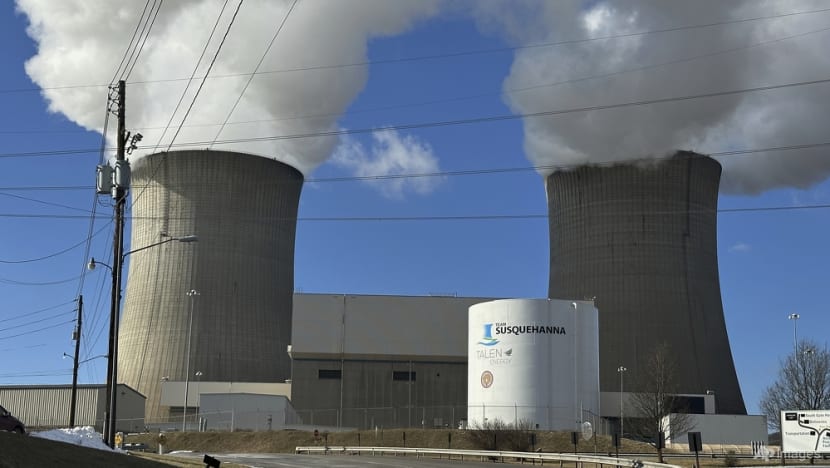Commentary: Is Singapore betting on nuclear energy over hydrogen and solar?
Singapore has to deal with twin challenges of climate change and energy security. Nuclear power is an increasingly viable solution, says RSIS’ Alvin Chew.


This audio is generated by an AI tool.
SINGAPORE: In his Budget 2025 speech, Prime Minister Lawrence Wong announced that the government will study the potential deployment of nuclear energy in Singapore.
In the years leading to this announcement, Singapore officials had said that efforts to understand the technology were underway, but no decision had been made about the deployment of nuclear energy.
Singapore aims to achieve net-zero carbon emissions by 2050. Its strategy to decarbonise its energy supply includes deploying solar power, importing cleaner electricity, and adopting low-carbon alternatives such as hydrogen production.
Mr Wong said that domestic sources of clean power are needed for greater energy resilience, and that there are “inherent challenges” in the production, storage and transportation of hydrogen.
This leads to a renewed focus on nuclear power, helped too by technological advancements over the last decade.
TWIN CHALLENGES OF CLIMATE CHANGE AND ENERGY SECURITY
It is certain that future energy sources will need to be clean and not include natural gas, which Singapore currently relies on for about 95 per cent of its electricity generation.
Not only is the burning of natural gas pollutive, Singapore’s supplies of natural gas are all imported. As we move into the age of digitalisation and embrace artificial intelligence in our daily activities, our energy consumption will be more intensive.
Thus, Singapore has twin challenges in dealing with climate change as well as energy security. Its pathway of energy transition will tackle these problems concurrently.
Generating solar power domestically will enhance its energy security profile. However, electricity generated from solar energy is intermittent in nature. A steady supply of energy is required to run the nation’s critical infrastructure, from desalination plants to data centres.
Moreover, because of limited territorial space, solar power can only make up a small fraction of Singapore’s energy mix.
NUCLEAR SAFETY IS THE HIGHEST PRIORITY
Nuclear energy has been powering some developed countries and helping them to advance their economies for decades. It provides 70 per cent of France’s electricity, and prior to the Fukushima nuclear accident, 30 per cent of Japan’s.
In 2012, just a year after the Fukushima nuclear accident, Singapore assessed that large conventional nuclear power plants were unsuitable for the country due to safety risks.
However, it has continued to explore nuclear energy and ways to mitigate risks. The Singapore Nuclear Research and Safety Initiative was established in 2014, deepening understanding of nuclear safety and new reactor technologies.
The advent of small modular reactors (SMRs) has made the deployment of nuclear energy an option for Singapore. SMRs with advanced Gen IV technologies have inherent safety features that will not lead to nuclear accidents such as in Chernobyl or Fukushima. However, very few SMRs have been deployed, so they lack a track record on operational safety.
Singapore has partnered with experienced countries to continue studying the safety of new reactor technologies. It is learning from the International Atomic Energy Agency to respond to a nuclear emergency and protect its population from radiation fallout.
Singapore is also contributing towards building a culture of nuclear safety within Southeast Asia.
THE FUTURE OF LOW-CARBON ALTERNATIVES
The advancement of nuclear energy may make other low-carbon forms of energy more viable in Singapore. Some sectors, such as aviation transport, are hard to electrify. Hydrogen can serve as an alternative to the pollutive jet fuel that is currently used by airlines.
However, hydrogen is presently produced using natural gas which is counter-effective in reducing carbon emissions. It is inefficient and costly to produce clean hydrogen through electrolysis from concentrated solar power.
With SMRs, hydrogen can be more efficiently produced via the thermochemical process. Advanced reactors such as the high-temperature gas-cooled reactor produce great amounts of heat to split water molecules and produce hydrogen.
Through nuclear, Singapore can sustain a hydrogen economy that is environmentally friendly.
Nuclear will feature prominently as an energy source in countries’ decarbonisation efforts. Though the technology has been developing since the 1950s, it is still nascent in Singapore and the region.
Therefore, policymakers should not rush into making decisions on deploying nuclear energy. Building up capabilities to assess the safe and secure deployment of nuclear energy is the rational approach.
Alvin Chew is Senior Fellow at S Rajaratnam School of International Studies (RSIS).


















